8 citations,
November 2023 in “Social Science & Medicine” Gendered social factors, not just biology, contribute to sex differences in adverse drug events.
5 citations,
November 2021 in “The journal of investigative dermatology/Journal of investigative dermatology” Wnt/β-catenin signaling is important for keeping skin cell attachment structures stable.
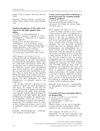 5 citations,
February 2009 in “International Journal of Cosmetic Science”
5 citations,
February 2009 in “International Journal of Cosmetic Science” Coenzyme Q10 helps reduce aging in human hair.
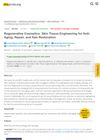
Regenerative cosmetics can improve skin and hair by reducing wrinkles, healing wounds, and promoting hair growth.
 12 citations,
December 2021 in “Aging”
12 citations,
December 2021 in “Aging” A new painless method to collect hair follicles helps study DNA damage and aging.
October 2020 in “Research Square (Research Square)” Aging-related changes in hair follicle stem cells can be partially reversed with a specific treatment.
 11 citations,
June 2019 in “Tissue & Cell”
11 citations,
June 2019 in “Tissue & Cell” Hair stem cells produce a protein called COL17A1 that plays a key role in their development and is linked to hair thinning and baldness.

Regenerative cosmetics can improve skin and hair by reducing wrinkles, healing wounds, and promoting hair growth.
March 2024 in “American journal of veterinary research” Clippers are the best tool for collecting dog hair for chemical tests, being fast and stress-free for the dog.
46 citations,
February 1983 in “The Journal of Dermatology” Hair regrowth slows with age due to changes in enzyme activity.
 4 citations,
October 2022 in “Frontiers in public health”
4 citations,
October 2022 in “Frontiers in public health” Cadmium chloride pollution can cause skin disorders, speed up aging, and prevent hair growth.
 180 citations,
January 2003 in “American Journal of Clinical Dermatology”
180 citations,
January 2003 in “American Journal of Clinical Dermatology” Menopause can lead to skin and hair problems due to hormonal changes, but hormone replacement therapy might help slow these effects.
 33 citations,
April 2005 in “British Journal of Dermatology”
33 citations,
April 2005 in “British Journal of Dermatology” Aging alone barely affects the number of hair follicles, meaning hair loss is minimal without other conditions like androgenetic alopecia.
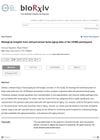 2 citations,
September 2019 in “bioRxiv (Cold Spring Harbor Laboratory)”
2 citations,
September 2019 in “bioRxiv (Cold Spring Harbor Laboratory)” Self-perceived facial aging is linked to skin pigmentation, immune system, hair loss in men, and genes related to the skin's structure.
 December 2024 in “Anti-Aging Eastern Europe”
December 2024 in “Anti-Aging Eastern Europe” PRP is effective for skin rejuvenation, hair restoration, and acne scar treatment.
 41 citations,
September 2012 in “Cellular and Molecular Life Sciences”
41 citations,
September 2012 in “Cellular and Molecular Life Sciences” MicroRNAs play a crucial role in skin and hair health, affecting everything from growth to aging, and could potentially be used in treating skin diseases.
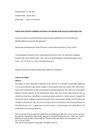 9 citations,
July 2013 in “Experimental Dermatology”
9 citations,
July 2013 in “Experimental Dermatology” Aging reduces the ability of human hair follicle cells to form new cell colonies.
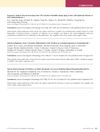 1 citations,
September 2012 in “Journal of Investigative Dermatology”
1 citations,
September 2012 in “Journal of Investigative Dermatology” Aging reduces stem cell activation, leading to hair loss in mice lacking a specific enzyme.
 December 2024 in “Biomaterials Research”
December 2024 in “Biomaterials Research” Exosomes from hair stem cells can reduce skin aging from UVB exposure.
 September 1998 in “Journal of The European Academy of Dermatology and Venereology”
September 1998 in “Journal of The European Academy of Dermatology and Venereology” Aging can lead to poorer scalp and hair health, including less hair and more scalp diseases, which should be managed to help older people feel better.
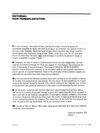 March 1985 in “Head & Neck Surgery”
March 1985 in “Head & Neck Surgery” Hair transplantation improves life quality by addressing scars, aging, and genetic flaws, but is limited by the availability of the patient's own hair for donation.
 16 citations,
July 2007 in “Facial Plastic Surgery Clinics of North America”
16 citations,
July 2007 in “Facial Plastic Surgery Clinics of North America” The document suggests using fat grafting and laser therapy to improve the aging Asian face and hair restoration techniques tailored to Asian hair characteristics, emphasizing natural results and cultural sensitivity.
2 citations,
October 1962 in “Archives of Dermatology” Surgical methods can't treat gray hair, hair loss, or thinning skin.
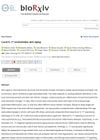 1 citations,
January 2022 in “bioRxiv (Cold Spring Harbor Laboratory)”
1 citations,
January 2022 in “bioRxiv (Cold Spring Harbor Laboratory)” Blocking IL-17 signaling can delay skin aging and improve skin and hair health.
 January 2016 in “Georg Thieme Verlag eBooks”
January 2016 in “Georg Thieme Verlag eBooks” The document recommends personalized, culturally sensitive treatments to rejuvenate the aging Asian face, focusing on natural results and specific techniques for skin, hair, and facial features.
8 citations,
March 2015 in “Molecular Medicine Reports” Hair dye ingredient PPD causes cell death and aging in human hair cells by altering microRNA levels.
 1 citations,
September 2016 in “British Journal of Dermatology”
1 citations,
September 2016 in “British Journal of Dermatology” Women with aging signs and heart issues have higher hair loss risk, which may predict shorter lifespan and affect attractiveness.
 72 citations,
July 2012 in “Journal of Investigative Dermatology”
72 citations,
July 2012 in “Journal of Investigative Dermatology” Mice lacking a key DNA methylation enzyme in skin cells have a lower chance of activating stem cells necessary for hair growth, leading to progressive hair loss.
 32 citations,
January 2022 in “International Journal of Molecular Sciences”
32 citations,
January 2022 in “International Journal of Molecular Sciences” Melatonin, a hormone, can help protect skin from aging by reducing stress, inflammation, and damage, and may also help treat hair loss in women.
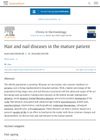 25 citations,
October 2017 in “Clinics in Dermatology”
25 citations,
October 2017 in “Clinics in Dermatology” Older adults commonly experience hair loss and nail disorders due to aging and health changes, affecting their quality of life.






















